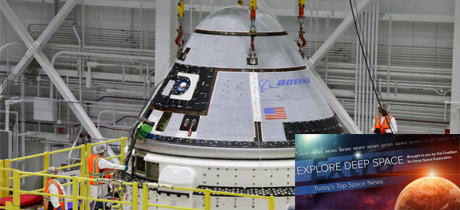In Today’s Deep Space Extra… Boeing, NASA look to a milestone uncrewed test flight of the CST-100 Starliner in December. Virgin Galactic goes public. The International Astronautical Congress (IAC) wraps up today in Washington D.C.
Human Space Exploration
NASA sets launch date for Starliner mission to Space Station
Coalition Member in the News – Boeing
Ars Technica (10/24): NASA and Boeing are looking to December 17 for the uncrewed test launch and mission of the CST-100 Starliner to the International Space Station (ISS). More pre-launch milestones await, including a Flight Readiness Review, prior to the actual launch attempt atop an Atlas V from Cape Canaveral Air Force Station, Florida. The Starliner is one of two commercial spacecraft that NASA’s Commercial Crew Program is looking to for regular launches of astronauts to the Space Station, something the U.S. has not been able to do since the space shuttle fleet was retired in 2011. SpaceX’s Crew Dragon completed its uncrewed test flight to the space station in March. Both companies must conduct crewed test flights as well.
Astronaut to control a Moon robot from the Space Station
Space.com (10/24): In a European Space Agency (ESA) demonstration from the International Space Station (ISS) planned for November, Italian astronaut Luca Parmitano will command a rover in the Netherlands as part of an experiment to assess how well orbiting astronauts might be able to control rover activities on the surfaces of the Moon and Mars. The exercise is called Analog-1 and will last about two hours.
Space Science
Chief Trump science adviser moves against foreign threat to research secrets
Washington Examiner (10/24): Kelvin Droegemeier, director of the White House Office of Science and Technology Policy, is advising the U.S. science community that protecting the nation’s research institutions from foreign exploitation is a top priority. Sharing close research ties with China is a special concern.
How long will it take to find proof of alien life?
Space.com (10/24): The profound question of when proof of evidence for life beyond Earth is confirmed was a topic of expert speculation this week at the International Astronautical Congress (IAC) in Washington D.C. Proof may surface first at Mars, perhaps within five to 15 years, according to one expert.
NASA encourages industry to develop spacecraft cleanliness standards
SpaceNews.com (10/24): NASA is calling in the commercial space industry to set standards for planetary protection, standards intended to prevent spacecraft from returning to Earth with biological contaminants. The agency itself is doing as much as it and other space agencies prepare to send new generations of spacecraft to the Martian surface to seek evidence for past or current biological activity.
Virgin Orbit to add extra rocket stage to LauncherOne for interplanetary missions
SpaceNews.com (10/24): Virgin Orbit is assessing an upper stage variant of its air launched LauncherOne rocket that is designed for small sat missions. The variant’s upper stage could send payloads of approximately 100 kilograms to the Moon, or 50 kilograms to Mars. John Fuller, Virgin Orbit advanced concepts director, presented the options before the International Astronautical Congress (IAC). The week long gathering in Washington D.C. concludes today.
Japanese lunar lander company ispace on schedule for 2021 first mission
SpaceNews.com (10/24): Takeshi Hakamada, founder of Tokyo-based ispace, said the company is structurally testing the first of its Hakuto-R series of Moon landers, with plans to launch the initial mission in 2021. Speaking at the International Astronautical Congress (IAC) in Washington D.C. this week, he described the first mission as a test flight, with the second launch to follow in 2023 with payloads that will include a rover.
Other News
Virgin Galactic merger wins shareholder approval
SpaceNews.com (10/24): Social Capital Hedosophia, a special-purpose acquisition company, has won shareholder approval to merge with Virgin Galactic, the suborbital passenger spaceflight company. More than 95 percent of the more than 61 million votes cast approved the merger. A formal closing is anticipated Friday. Virgin Galactic then becomes the first publicly traded company whose primary line of business is human spaceflight. Virgin Galactic founder Sir Richard Branson plans to be at the New York Stock Exchange on October 28 to ring the opening bell.
Space manufacturing may soon remake the planet below
Bloomberg (10/23): Entrepreneurs are looking to the microgravity of space for the manufacture of new products ranging from highly efficient cabling for communications to human organs for transplant. Giant Leap, a Bloomberg Originals series, is assessing the prospects.
Chinese commercial launch companies are preparing second generation rockets
SpaceNews.com (10/24): In China, commercial launch companies are developing larger rockets featuring liquid propellants, including liquid methane and oxygen. Also, Origin Space, a Shenzhen-based asteroid mining startup, has raised $7 million in funding, with investment coming from Matrix Partners China and Linear Venture, according to an announcement from China earlier this month.
Apollo 16 astronaut Charlie Duke starts business to send custom-made messages into space
Florida Today (10/22): Duke, the Apollo 16 lunar module pilot, was among a dozen NASA astronauts who walked on the Moon. That was in 1972. Duke has started a new business, AstroGram, for the production of custom made plaques that can be launched into space. Duke’s aim is to create more awareness of space and inspire.

